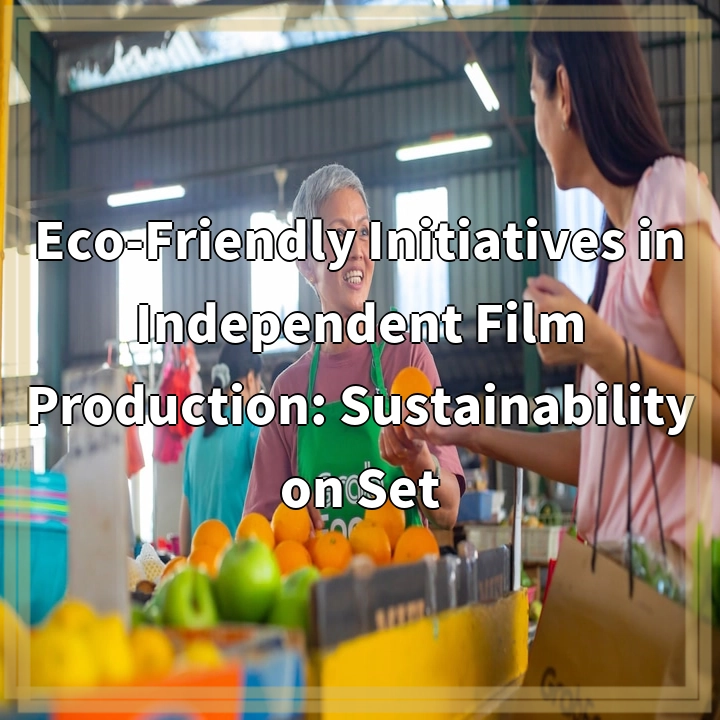
What is Eco-Friendly Initiatives in Independent Film Production: Sustainability on Set?
Eco-friendly initiatives in independent film production refer to the efforts taken to minimize the environmental impact of filmmaking activities. It involves adopting sustainable practices throughout the entire production process, from pre-production to post-production and beyond. By integrating eco-friendly initiatives, independent filmmakers aim to reduce waste, conserve resources, and promote a more sustainable approach to filmmaking.
Real-World Problems Associated with Eco-Friendly Initiatives in Independent Film Production
Despite the growing awareness and implementation of eco-friendly initiatives in the film industry, there are still several challenges that need to be addressed. These problems include:
Limited Budget and Resources
Independent filmmakers often face budget constraints, making it difficult to invest in sustainable alternatives or technologies. The higher upfront costs of eco-friendly equipment or materials can deter independent productions from adopting sustainable practices.
Lack of Awareness and Education
Many filmmakers, particularly those in the independent sphere, may lack knowledge about sustainable practices and their benefits. There is a need for increased awareness and education regarding the environmental impact of filmmaking and the available eco-friendly alternatives.
Logistical Challenges
Filmmaking involves complex logistics, including travel, location scouting, and equipment transportation. Each of these aspects contributes to a film’s carbon footprint. Finding eco-friendly solutions that can accommodate the needs and restrictions of independent productions can be challenging.
Waste Management
Film production generates significant amounts of waste, ranging from discarded set pieces and props to plastic water bottles and food waste. Proper waste management, including recycling and composting, is crucial in reducing the environmental impact of independent film production.
Collaboration and Industry Norms
The film industry is inherently collaborative, involving numerous stakeholders such as cast, crew, and production companies. Implementing eco-friendly initiatives often requires overcoming resistance and changing established industry norms. Balancing the creative needs of a production with sustainable practices can be a delicate task.
Measurement and Reporting
Tracking and measuring the environmental impact of independent film productions is essential to assess the effectiveness of eco-friendly initiatives. However, there is a lack of standardized metrics and reporting frameworks specifically tailored to the film industry, making it challenging to accurately evaluate sustainability performance.

Solutions for Eco-Friendly Initiatives in Independent Film Production: Sustainability on Set
Addressing the real-world problems associated with eco-friendly initiatives in independent film production requires innovative solutions and collective efforts. Here are potential solutions to overcome these challenges:
1. Budget-Friendly Alternatives
Independent filmmakers can explore cost-effective eco-friendly alternatives, such as using energy-efficient lighting equipment, renting or borrowing sustainable set materials, and reducing waste through careful planning and resource management.
2. Education and Training
Increasing awareness and education about sustainable filmmaking practices is crucial. Filmmakers can attend workshops, engage in online resources, and collaborate with sustainability organizations to learn about eco-friendly techniques and incorporate sustainable practices into their productions.
3. Collaboration and Industry Initiatives
Building partnerships with like-minded individuals and organizations can help drive industry-wide sustainability initiatives. Filmmakers can join industry associations, participate in sustainability programs, and collaborate with suppliers and production companies that prioritize eco-friendly practices.
4. Waste Reduction and Management
Implementing effective waste management strategies, including recycling and composting, can significantly reduce the environmental impact of film production. Filmmakers can work with waste management companies, set up recycling stations on set, and encourage the use of reusable products instead of single-use items.
5. Advocacy and Awareness
Filmmakers can use their films as a platform for raising awareness about environmental issues and promoting sustainable lifestyles. By incorporating sustainability themes into their narratives, they can inspire audiences and encourage individual actions towards a greener future.
6. Metrics and Reporting Systems
Developing standardized metrics and reporting systems specifically tailored to the film industry can help evaluate the progress and impact of eco-friendly initiatives. Filmmakers can collaborate with sustainability experts and organizations to establish guidelines and measurement frameworks that assess the sustainability performance of their productions.
By implementing these solutions, independent filmmakers can minimize their environmental footprint, contribute to a more sustainable film industry, and inspire others to make eco-friendly choices.















